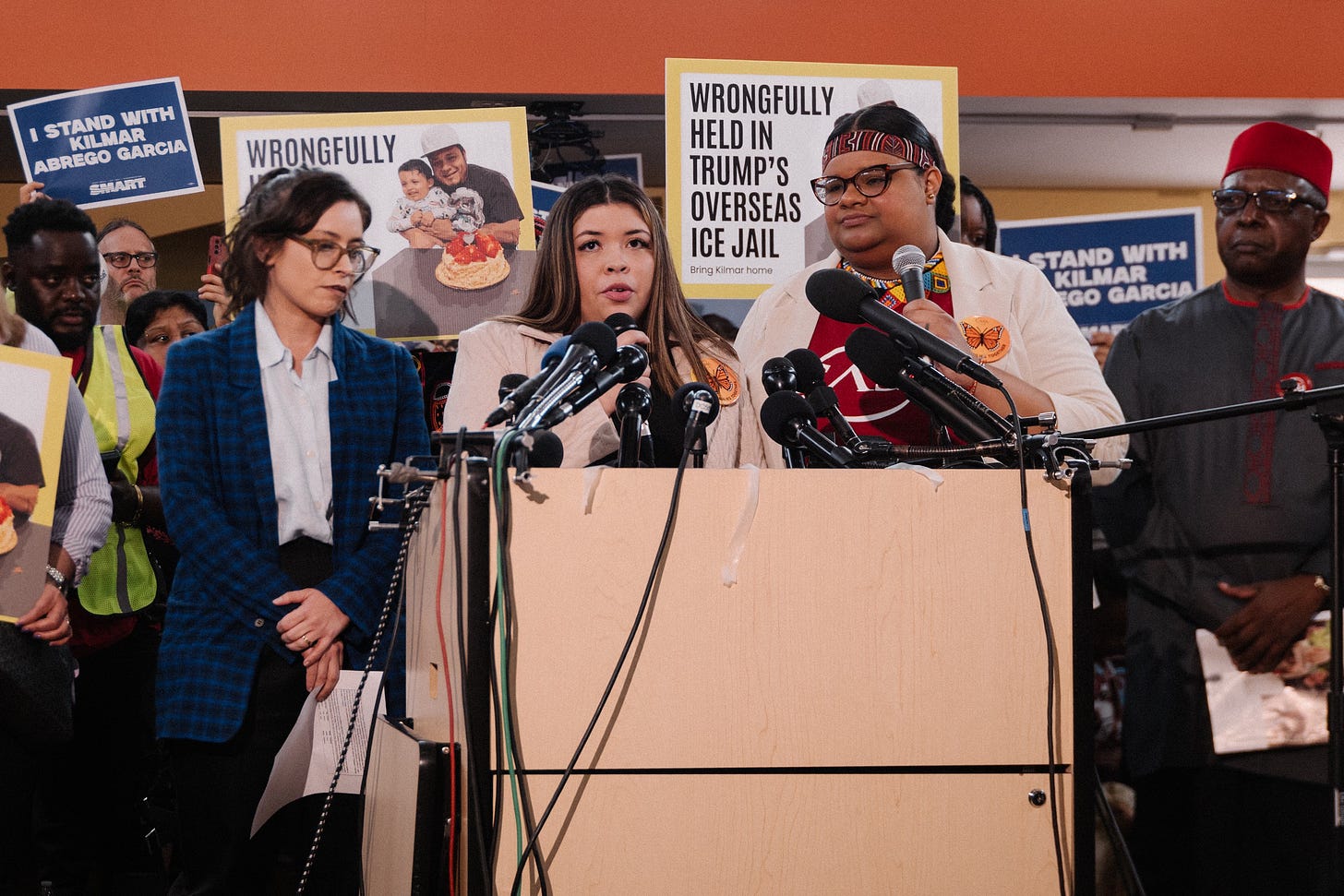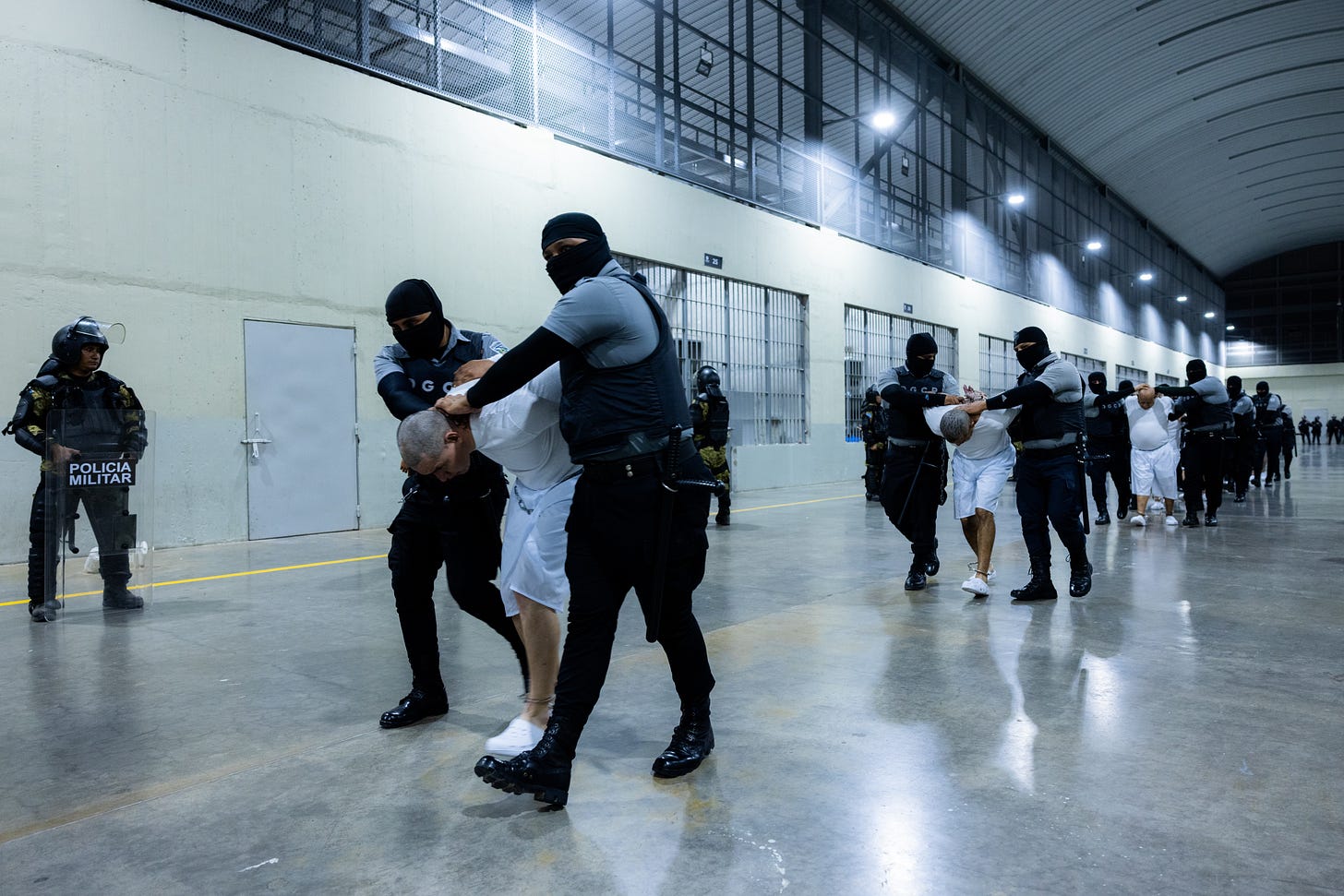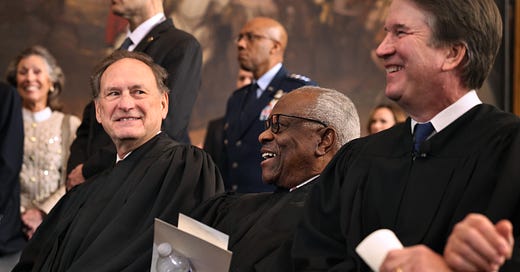The Supreme Court Just Wants Trump to Break the Law the Right Way
The opinion in the case of Kilmar Abrego Garcia shows little interest in actually bringing him home, or holding the White House accountable for failing to do so.
On Thursday, 26 days after the Trump administration shipped Kilmar Armando Abrego Garcia, a sheet metal worker in Maryland, to a notorious Salvadoran megaprison due to what the White House calls an “administrative error,” the Supreme Court at last decided to intervene. In a three-paragraph, unsigned opinion with no noted dissents, the justices mostly upheld a district court order requiring the Trump administration to retrieve Abrego Garcia from El Salvador, and to thereafter “ensure” that his case “is handled as it would have been had he not been improperly sent” there in the first place.
Already, the Trump administration has resumed its fight to banish Abrego Garcia, a 29-year-old father with a legally protected immigration status and no criminal record, to some country other than this one. But for now, at least, the Fifth Amendment’s guarantee of due process still means that the government can’t black-bag you, accidentally (or “accidentally”) send you to a gulag from which no one has ever been released, and then claim that the Constitution unfortunately renders federal courts powerless to do anything about it.
The opinion did contain an asterisk: Although the justices left in place Judge Paula Xinis’s order that the Trump administration “facilitate” Abrego Garcia’s return, they expressed trepidation about her use of the word “effectuate,” which, they said, “may exceed” her authority. The opinion thus directed Xinis to “clarify” this aspect of her order on remand, “with due regard for the deference owed to the Executive Branch in the conduct of foreign affairs.”
To understand what’s going on in these few sentences, you have to place yourself in the shoes of the most tedious law professor you know. “Facilitate” generally refers to making something easier or more likely, and often connotes good-faith effort. “Effectuate,” on the other hand, usually implies the accomplishment of a specific result. If you will permit me a basketball analogy, a good point guard “facilitates” the team’s offensive attack, but only if the possession ends in a bucket would we say that the point guard “effectuated” the goal of scoring points.

Neither “facilitating” nor “effectuating” Abrego Garcia’s return should be challenging here. The Trump administration is paying the Salvadoran government millions of dollars to warehouse Abrego Garcia, along with hundreds of other migrants; just as a matter of common sense, taking back a wrongly incarcerated person should be well within its rights. The Court’s insistence on parsing these terms is thus troubling because it suggests that the justices are fine with a judge ordering the White House to try to get Abrego Garcia out of a foreign prison ridden with human rights violations. But the justices are not quite as sure about maybe, possibly, theoretically holding the executive branch accountable if it does not actually bring him home.
Late Thursday, Xinis indeed issued an amended order that omits the word “effectuate,” but otherwise reiterates the government’s obligation to “facilitate” Abrego Garcia’s return, and she ordered the Justice Department to file a progress report by 9:30 A.M. Friday morning. The Trump administration, in an early sign of how seriously it intends to treat this matter, immediately asked for an extension until next Tuesday. After a clearly annoyed Xinis gave the Justice Department an additional two hours but no more, DOJ declared that it would not comply with this “unreasonable” and “impracticable” deadline, either, thus ensuring that Abrego Garcia will continue to languish in prison for at least a while longer.
A separate statement from Justice Sonia Sotomayor, attached to the Court’s opinion but signed only by the three liberals, excoriated the government for its “plainly wrong” argument that courts cannot do anything about deportations, wrongful or otherwise, once the person in question is beyond the limits of U.S. airspace. Only Sotomayor makes explicit the obvious implication of the government’s legal theory: that the Trump administration can disappear anyone, even American citizens, “so long as it does so before a court can intervene.” Sotomayor is not offering up a parade of horribles; she is referring to a proposal for which Trump himself expressed support earlier this week.

Sotomayor concludes by setting out the government’s obligations to Abrego Garcia going forward, which the Court’s main opinion obfuscates with a cowardly bit of passive voice. The Trump administration, Sotomayor says, must comply with the Due Process Clause, and international treaties forbidding torture, and an array of federal laws related to detention and removal that require warrants, hearings, and other procedural safeguards. “In the proceedings on remand, the District Court should continue to ensure that the Government lives up to its obligations to follow the law,” Sotomayor writes.
The Court’s opinion and Sotomayor’s statement reach the same basic conclusion: The government was wrong to deport Abrego Garcia, and has to follow the rules. But it is hard not to read Sotomayor’s statement as, if not quite a dissent, then as a protest of the majority’s tepid language, which only requires the administration to put in an undefined level of effort into bringing him home. By further qualifying the holding by emphasizing the “deference owed to the Executive Branch in the conduct of foreign affairs,” the Court’s opinion in Noem v. Abrego Garcia smacks of its previous decisions—the initial Muslim ban cases, for example—that purported to reprimand the Trump administration for not following the law, while also providing its lawyers with helpful hints about what to say next time in order to pass legal muster.
You can tell a lot about the Court’s priorities by listening to the stories it tells—whose rights and lives it considers important enough to learn about, and whose aren’t. Here, the full Court has nothing to say about the horrific details of Abrego Garcia’s kidnapping and disappearance, or rebuke the government for trampling the constitutional rights the justices claim to protect. And in the same breath that they side with Abrego Garcia, the justices reiterate the primacy of executive power and preemptively caution the judge—the same judge whose order they are purporting to uphold—not to get too far out over her skis in the proceedings to come. As the law professor Sherrilyn Ifill observed, it is unsettling to consider what about Sotomayor’s objectively correct descriptions of mandatory legal process made all six conservatives read it over and decide, No, I can’t sign my name to that.
It is of course good that the Court did not reject Abrego Garcia’s claims altogether, in that it is good that the Fifth Amendment still exists in any meaningful sense. But the conservative justices do not want to protect Abrego Garcia’s rights. They just want the Trump administration to tell a better lie about why it can legally violate them.
As always, you can find everything we publish at ballsandstrikes.org, or follow us on Bluesky at @ballsandstrikes.org. You can get in touch by emailing us at contact@ballsandstrikes.org. Thanks for reading.
This Week In Balls & Strikes
Anti-Choice Lawyer Reduced to Writing Humiliating Op-Ed Begging For John Roberts’s Vote, Susan Rinkunas
Oral argument in Medina v. Planned Parenthood South Atlantic didn’t go great for the Alliance Defending Freedom, so John Bursch is giving it another shot.
The Republican Justices Do Not Want to Talk About the Human Suffering They’re Enabling, Madiba Dennie
An opinion allowing the mass removal of American residents to a Salvadoran prison should probably mention the words “El Salvador.”
If the Trump Administration Can Disappear Kilmar Abrego Garcia, It Can Disappear Anyone, Jay Willis
The White House is asking the Supreme Court’s conservative supermajority for a Fifth Amendment pass.
Republicans Are Getting Awfully Close to Stealing a North Carolina Supreme Court Seat, Madiba Dennie
Jefferson Griffin kept getting laughed out of court, until he found one with two Republican judges sitting on it.
This Week In Other Stuff We Appreciated
“A Path of Perfect Lawlessness,” Adam Serwer, The Atlantic
“It is no surprise that Trump is now acting as though he is above the law. After all, the Roberts Court all but granted him permission.”
What, Exactly, Is the Supreme Court Thinking?, Quinta Juceric, The Atlantic
The justices exhibit a disturbing willingness to ignore the human costs of Trump’s actions, preferring instead to remain within the more comfortable zone of high-minded legal theory.





The SCOTUS “statement” was bullshit. See my substack post in which I basically say their wiggle dance of a statement was yet another step toward Hitler’s complete takeover of the Judiciary in Weimar Germany after January 1933: https://williamnfordes.substack.com/p/scotus-please-sir-can-we-have-some
If you look at the antonyms for the word “effectuate” it is completely clear what the judges mean.
https://www.merriam-webster.com/thesaurus/cause
I don’t know how it could have been written more clearly.